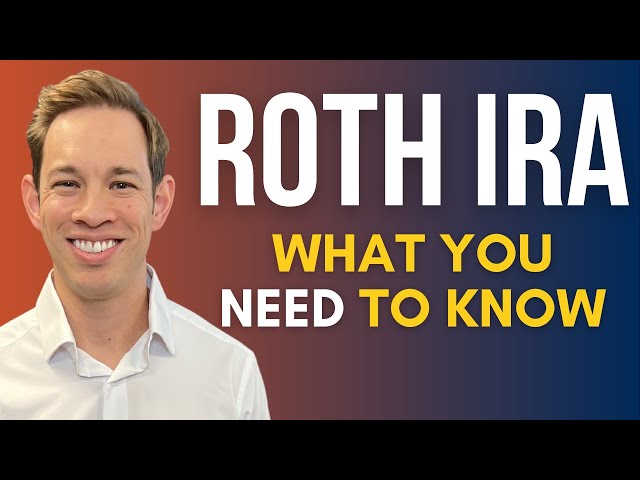The Benefits of a Roth IRA: A Comprehensive Guide
In today’s financial landscape, planning for retirement has become increasingly important. One of the most effective ways to secure a comfortable retirement is by investing in a Roth IRA. In this article, we will explore the numerous benefits of a Roth IRA and why it is a smart financial move for individuals looking to grow their wealth while enjoying tax advantages.
Tax-Free Growth
One of the primary advantages of a Roth IRA is the potential for tax-free growth. Unlike traditional IRAs, contributions to a Roth IRA are made with after-tax dollars. This means that any earnings and investment gains within the account can grow tax-free over time. When you eventually withdraw funds from your Roth IRA during retirement, these withdrawals are generally tax-free as well, provided you meet certain requirements.
Flexibility
A Roth IRA offers greater flexibility compared to other retirement accounts. Unlike traditional IRAs, which have required minimum distributions (RMDs) starting at age 72, a Roth IRA has no RMDs during the account owner’s lifetime. This means you can leave the funds in your Roth IRA to continue growing tax-free for as long as you wish, allowing you to pass on a larger inheritance to your beneficiaries.
Tax-Free Withdrawals
One of the key benefits of a Roth IRA is the ability to make tax-free withdrawals. As long as you have held the account for at least five years and are over the age of 59½, you can withdraw both your contributions and any earnings tax-free. This flexibility provides peace of mind during retirement, knowing that you can access your funds without worrying about tax implications.
No Age Restrictions
Unlike traditional IRAs, which have age restrictions on contributions, a Roth IRA allows individuals of any age to contribute as long as they have earned income. This makes it an attractive option for individuals who want to continue saving for retirement even after reaching traditional retirement age.
Diversification
Investing in a Roth IRA provides an opportunity to diversify your retirement savings. You can choose from a wide range of investment options, including stocks, bonds, mutual funds, and exchange-traded funds (ETFs). By diversifying your investments, you can potentially reduce risk and increase the likelihood of long-term growth.
Estate Planning Benefits
A Roth IRA can also offer estate planning benefits. While traditional IRAs may be subject to income taxes upon inheritance, a Roth IRA can be passed on to your beneficiaries tax-free. This allows you to leave a lasting legacy for your loved ones while minimizing their tax burden.
No Required Minimum Distributions (RMDs)
As mentioned earlier, a Roth IRA does not have required minimum distributions (RMDs) during the account owner’s lifetime. This provides greater flexibility in managing your retirement income. You can choose to withdraw funds as needed or let them continue growing tax-free, depending on your financial situation.

A Roth IRA offers numerous benefits that make it an attractive option for retirement savings. With tax-free growth, flexibility, and the ability to make tax-free withdrawals, a Roth IRA provides individuals with a powerful tool to secure their financial future. Additionally, the absence of age restrictions, diversification opportunities, estate planning benefits, and the lack of required minimum distributions further enhance the appeal of a Roth IRA. Consider consulting with a financial advisor to determine if a Roth IRA is the right choice for your retirement goals.
Frequently Asked Questions about the Benefits of a Roth IRA
1. What is a Roth IRA?
A Roth IRA is an individual retirement account that allows you to contribute after-tax income, and the earnings grow tax-free.
2. What are the advantages of a Roth IRA?
The main advantages of a Roth IRA include tax-free withdrawals in retirement, no required minimum distributions (RMDs), and the ability to contribute even after age 70½.
3. Can I contribute to a Roth IRA if I have a 401(k) or other retirement plan?
Yes, you can contribute to a Roth IRA even if you have a 401(k) or other retirement plan. However, there may be income limits for contributing to a Roth IRA.
4. Are there any income limits for contributing to a Roth IRA?
Yes, there are income limits for contributing to a Roth IRA. For 2021, the income limits are $140,000 for individuals and $208,000 for married couples filing jointly.
5. What is the maximum contribution limit for a Roth IRA?
The maximum contribution limit for a Roth IRA in 2021 is $6,000 for individuals under age 50 and $7,000 for individuals age 50 and older.
6. Can I withdraw my contributions from a Roth IRA penalty-free?
Yes, you can withdraw your contributions from a Roth IRA penalty-free at any time. However, withdrawing earnings before age 59½ may result in penalties and taxes.
7. Are there any tax benefits during retirement with a Roth IRA?
Yes, during retirement, qualified withdrawals from a Roth IRA are tax-free, providing a significant tax advantage compared to traditional retirement accounts.
8. Can I convert my traditional IRA to a Roth IRA?
Yes, you can convert your traditional IRA to a Roth IRA. However, you will have to pay taxes on the converted amount in the year of conversion.
9. Are there any age restrictions for opening a Roth IRA?
No, there are no age restrictions for opening a Roth IRA. As long as you have earned income, you can contribute to a Roth IRA.
10. Can I leave a Roth IRA to my heirs?
Yes, you can leave a Roth IRA to your heirs. They will have to take required minimum distributions (RMDs), but the distributions will be tax-free.




